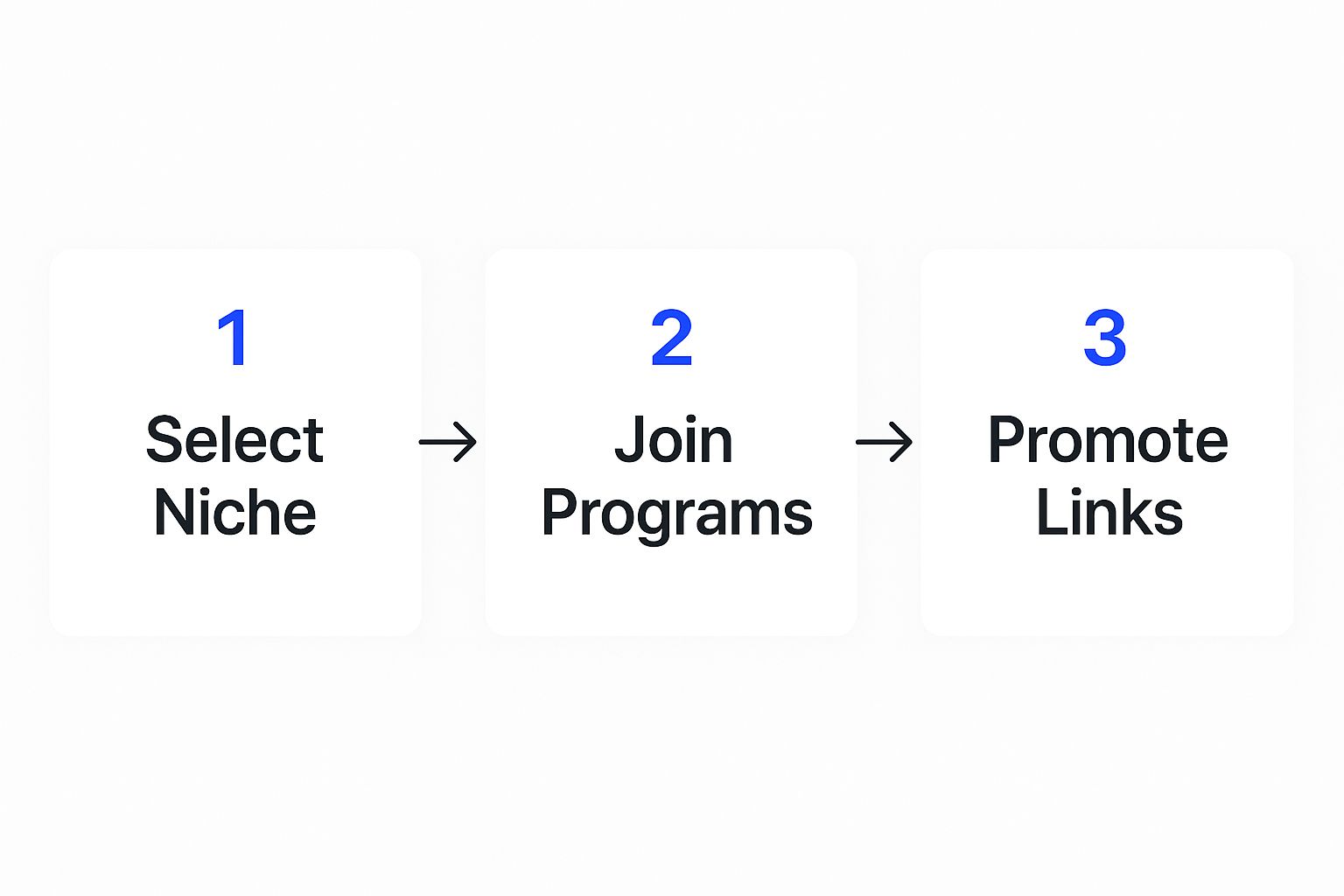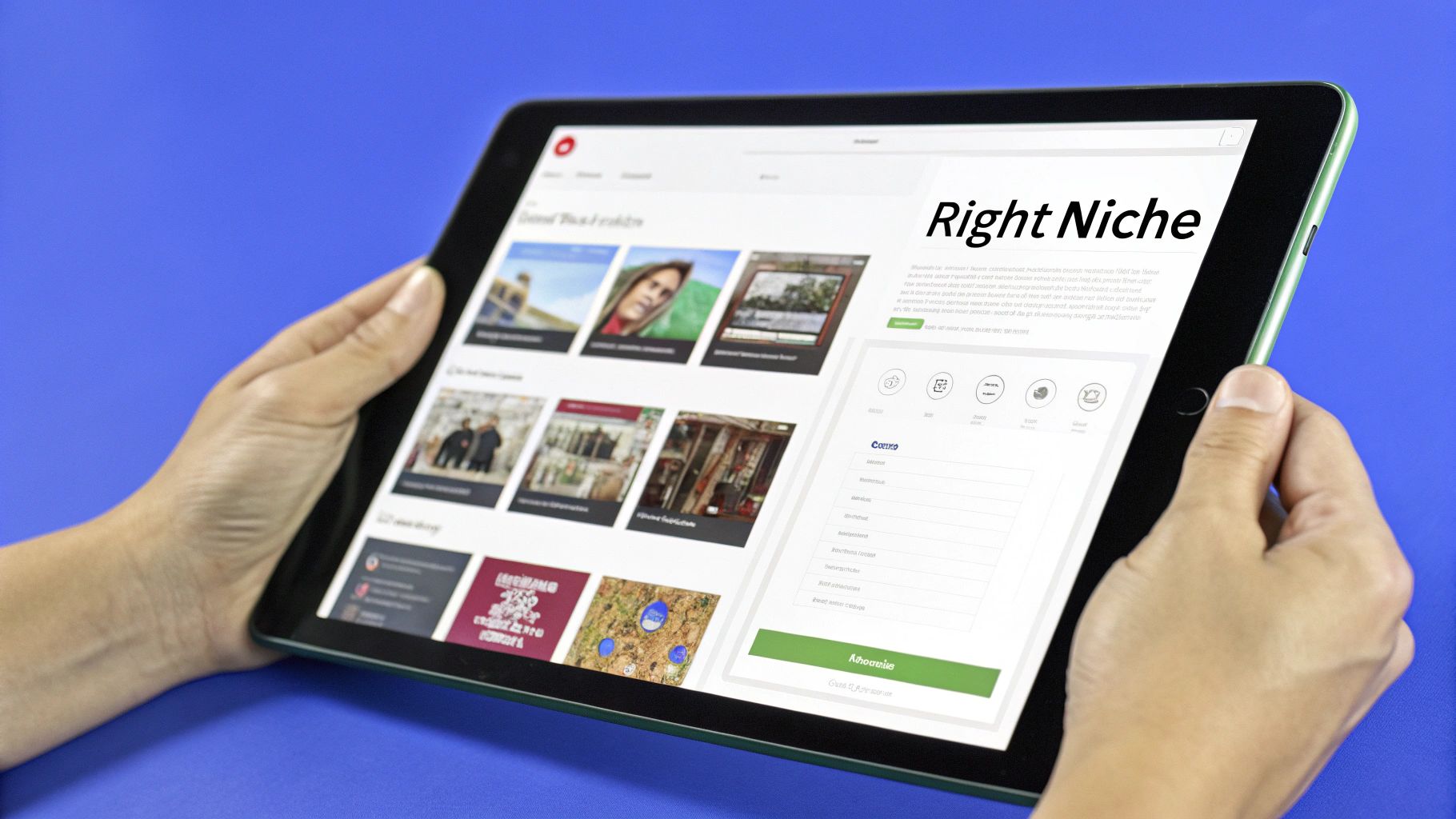Is Affiliate Marketing Worth It? A Realistic Guide
Is Affiliate Marketing Worth It? A Realistic Guide
Ollie Efez
September 16, 2025•17 min read

Is affiliate marketing really worth the effort? Absolutely—but with a big "if." It's worth it if you treat it like a real business, not some get-rich-quick fantasy. Success isn’t about finding a secret hack; it’s about earning genuine trust with an audience.
Think of it as running a marathon, not a sprint. It takes time, strategy, and a whole lot of persistence.
A Clear-Eyed View of the Opportunity

Affiliate marketing isn't just a side hustle; it's a powerful and legitimate business model when done right. To figure out if it's a good fit for you, you need to see yourself as a trusted guide. Your job is to connect your audience with proven, valuable solutions to their problems.
When you do that, your income becomes a direct reflection of the value you provide. It’s not about pushing products on people. It’s about solving real problems with things you genuinely believe in. Getting that mindset right is the first, and most important, step toward long-term success.
Setting Realistic Expectations from Day One
Forget the hype about overnight success. Building a profitable affiliate business takes a strategic approach and a healthy dose of patience. The most successful people in this game focus on building a brand and an audience first. Monetization comes second.
This guide is designed to be your practical roadmap, giving you the tools to build a sustainable business from scratch. We'll walk through how to navigate the common pitfalls and capitalize on the real rewards.
The core principle is simple: Authenticity scales, gimmicks don't. Your audience will reward you for honest recommendations that actually improve their lives, and that's the most reliable path to consistent affiliate income.
The numbers back this up. From a business standpoint, affiliate marketing shows impressive returns and huge growth potential. The global industry is projected to leap from $27.8 billion in 2024 to a staggering $48 billion by 2027.
Plus, with over 80% of brands using affiliate programs, it’s clear that businesses find it incredibly valuable. You can dive into the latest affiliate marketing stats to see the trends for yourself. This guide will show you how to claim your piece of that growing pie.
Affiliate Marketing at a Glance: A Quick Verdict
To quickly size up if affiliate marketing is the right move for you, it helps to break down the key factors. This table gives you a straightforward look at what to expect, especially if you're just starting out.
Ultimately, the verdict is clear: affiliate marketing offers a low-risk, high-reward opportunity for those willing to put in the work. It’s a marathon, and this table helps set the right pace from the starting line.How Affiliate Marketing Really Works Behind the Scenes
Let's pull back the curtain on affiliate marketing. Forget the complicated diagrams and industry speak for a moment. At its heart, the concept is incredibly simple.
Think of it like recommending a fantastic local coffee shop to a friend. You rave about their espresso, your friend goes and buys a latte, and the coffee shop owner is so grateful they give you a free coffee next time you're in. That’s it. You connected someone you know with something you love, and you got a little something for making it happen.
This entire system runs on a partnership between four key players. Each has a specific job, and they all need each other for the process to work.
The Four Key Players in Every Transaction
Let's meet the cast of characters:
- The Merchant (or Business): This is the creator of the product or service. In our analogy, it’s the coffee shop owner who roasts the beans and pulls the perfect espresso shot.
- The Affiliate (That’s You): You’re the passionate recommender—the trusted friend with great taste in coffee. You're the one connecting your audience to the merchant’s amazing product.
- The Customer: This is your friend who took your advice and is now enjoying a great cup of coffee. They're the one who ultimately makes the purchase.
- The Affiliate Network: Think of this as the digital barista who keeps a tally. It’s the platform or software that tracks who recommended whom, ensuring you get your free coffee (or commission) when your friend makes a purchase.
The magic that holds all of this together is your unique affiliate link. It's the linchpin of the whole operation.
Your affiliate link is your digital signature. When a customer clicks it, a small tracking file called a cookie is placed on their device. This little file essentially tells the merchant, "Hey, this person came from over there!" It’s how you get credit for the sale.
This tracking is absolutely critical. Without it, you’re just shouting into the void. Proper tracking is what proves your value and makes sure you get paid for your hard work. But it's not always straightforward, which is why it's so important to understand the nuances of affiliate attribution to ensure your sales are properly credited.
Finally, let's talk about how you get paid. The most common setup is Pay-Per-Sale (PPS), where you earn a percentage of every sale made through your link. Simple and direct.
However, there are other models, like Pay-Per-Lead (PPL), where you get paid when someone signs up for a newsletter or fills out a form. There’s also Pay-Per-Click (PPC), which pays you for just sending traffic, though this is less common for most affiliates. This flexibility means you can find a model that fits exactly what you and your audience are all about.
Weighing The Rewards Against The Realities
So, is affiliate marketing actually worth it? To answer that, you need a clear-eyed view of both the incredible opportunities and the very real challenges. It’s a business model with serious highs and lows, and understanding that balance right from the start is the key to making it work long-term.
On the one hand, the appeal is massive. Affiliate marketing offers a level of freedom that’s hard to find anywhere else. The startup costs are practically non-existent—you don't have to create a product, hold inventory, or deal with shipping. Your main investment is your time and your creativity.
This is what opens the door to building a genuine passive income stream. Think about it: a well-written article or a single helpful video can keep earning you commissions for months, or even years, after you hit publish. It's the classic dream of making money while you sleep.
The Bright Side Of The Business
The advantages are compelling, especially for self-starters who want flexibility and independence. You really are your own boss, with the freedom to work from pretty much anywhere you can get a Wi-Fi signal.
Here’s a quick rundown of the big wins:
- Low Financial Risk: You can get started with little more than a domain name or a social media profile. There's no need for a big pile of cash upfront, which makes it accessible to just about anyone.
- Ultimate Flexibility: You set your own hours and choose your work location. This is perfect if you're chasing a better work-life balance or just want to turn a passion into a side hustle.
- No Product Creation Headaches: Your job is to be a trusted guide, not a product developer. This lets you focus entirely on what you do best: creating great content and connecting with your audience.
This graphic breaks down the core process. You find a niche you care about, join affiliate programs that serve that audience, and then share your unique links through genuinely helpful content.

The beauty is in the simplicity. You get to focus on creating content, not on spreadsheets and shipping logistics. But don't be fooled—this straightforward model comes with its own set of demanding realities.
The Unfiltered Reality Of The Grind
While the rewards are real, the path to get there is paved with a ton of consistent effort and patience. Let's be clear: this is not a get-rich-quick scheme. It’s a marathon that requires serious dedication.
Here are the main challenges you’ll face:
- Building an Audience Takes Time: Success is built on trust, and trust doesn't happen overnight. You have to consistently provide value for months before you can expect to see any kind of substantial income.
- Income Can Be Unpredictable: Especially when you're starting out, your earnings will be all over the place. A great month might be followed by a slow one, so you'll need to be smart with your money.
- Competition is Fierce: You are definitely not the only person promoting products in your niche. To stand out, you need a unique voice, top-notch content, and a deep understanding of what your audience really wants.
- You Don't Control the Programs: The companies you partner with can change their commission rates or even shut down their affiliate programs with very little warning. An income stream you rely on could disappear in an instant.
To help you see the full picture, here’s a straightforward look at the good and the bad.
The Reality of Affiliate Marketing Pros vs Cons
Ultimately, deciding if affiliate marketing is worth it means being honest with yourself. Are you prepared for both sides of this coin? The freedom is real, but it has to be earned through hard work and persistence.What Can You Realistically Expect to Earn?

Alright, let's talk money. You’ve probably seen the flashy headlines about affiliates making six-figure incomes every month. While those stories are great motivation, they're the exception, not the rule—especially when you're just starting out.
To figure out if affiliate marketing is really worth your time, you need a realistic view of what’s possible.
At its core, your potential income boils down to a simple formula: (Traffic x Conversion Rate) x Commission Rate. Each piece of that puzzle is tied directly to your niche, the quality of your content, and the trust you build with your readers. A blog with tons of traffic but no real engagement won't make a dime, whereas a smaller, loyal audience can become a surprisingly powerful source of income.
From Your First Dollar to a Steady Income
Getting to a reliable affiliate income is a marathon, not a sprint. The good news is that most people who succeed follow a pretty similar path, which can help you set realistic goals for yourself.
Here’s what that journey usually looks like:
- The First $100: This is the big one. Seriously. Making that first sale proves your concept works and that people actually trust what you have to say. This stage is all about experimenting to see what clicks with your audience.
- Hitting $1,000 a Month: Reaching this level is a sign of consistency. You’ve probably nailed down a profitable niche, built a steady flow of traffic, and figured out how to turn your visitors into buyers.
- Building a Real Business: Once you cross that $1,000 mark, you're no longer just dabbling. You're running a business. This is where you might start exploring new traffic sources, negotiating better commission deals, or even hiring help to create more content.
Want to get a clearer picture of your own potential? A great way to ground your expectations is to play with the numbers. You can use an affiliate commission calculator to see how different conversion rates and commission structures could impact your bottom line.
How Your Niche Dictates Your Paycheck
Your choice of niche will have a massive effect on your earning potential. Think about it this way: a food blogger promoting a $20 kitchen gadget with a 5% commission earns just $1 per sale. On the other hand, a finance blogger reviewing software could earn $500 from a single sign-up.
But don't assume high-ticket items are always the answer. A lower-priced product with a huge, eager audience can easily outperform a niche product with a massive commission but only a handful of potential buyers.
It’s also important to remember the value you're providing to the business. Customers who come from an affiliate referral often have a 21% higher average order value and stick around longer. That’s why brands are more than happy to pay good commissions for high-quality leads.
Your First Steps to Becoming an Affiliate Marketer
Feeling fired up and ready to dive in? Perfect. That's the energy you want. Now, let's channel that motivation into building a real business with a solid foundation.
We'll walk through the three key pillars that every successful affiliate marketer builds on. Getting these right from the start is what makes the answer to "is affiliate marketing worth it?" a definite yes for you.
Think of it like framing a house. You can't rush this part. A strong frame means everything you add later—the walls, the roof, the windows—will be stable and secure. A shaky start just means you'll be making frustrating repairs later on.
Find Your Niche
Your niche is simply the specific topic you'll focus on and the audience you'll serve. The sweet spot is where your genuine interests, your actual knowledge, and market demand all overlap. It's tempting to chase the biggest commissions, but trust me, pick a topic you actually care about.Why? Because your audience can spot a fake a mile away. If you're not genuinely enthusiastic, it will show. Authenticity is your greatest currency in this business.
To lock in on your perfect niche, ask yourself a few honest questions:
- What could I talk about for years without getting bored? Think about your hobbies, passions, and the things you can't stop learning about.
- What problems have I solved for myself or others? Your personal experiences are a goldmine for creating content that truly connects and helps people.
- Are companies actually paying for customers in this area? A quick Google search for "[your topic] affiliate programs" will tell you if there's money to be made.
A great niche isn't just about what you know—it's about who you can help. Serving a specific audience with real solutions builds the trust needed for affiliate sales.
Choose Your Platform
Once you know what you'll be talking about, you need to decide where you'll be talking about it. This is your home base, the place where you'll build a community and share your recommendations. There's no single "best" platform; the right choice comes down to your strengths and where your target audience hangs out online.Here are the most popular options:
- A Blog: Nothing beats owning your own website. You have total control, it’s a powerful asset for search engine traffic, and it's the best way to build long-term authority. Our guide on affiliate marketing for beginners goes deep into setting up your first blog.
- YouTube Channel: If you're good on camera, video is an amazing way to build a personal connection. It's perfect for showing products in action, doing tutorials, and letting your personality shine.
- Social Media: Platforms like Instagram, TikTok, or Pinterest are fantastic for visual niches. Think fashion, home decor, fitness, or anything where a picture or short video can tell the whole story.
Join Reputable Affiliate Programs
Okay, you've got your niche and your platform. Now it's time to find great products to promote. The best place to start is with products or services you already use and genuinely love. It's so much easier (and more honest) to recommend something you can personally vouch for.From there, you can explore big affiliate networks like ShareASale or Impact. These marketplaces connect you with thousands of brands across just about every industry you can think of.
But don't just jump at the highest commission rate. Look at the whole picture: the company's reputation, the quality of their products, and the kind of support they offer their partners. Joining an affiliate program is a partnership, so make sure you're teaming up with brands you can be proud to represent.
Global Trends and Future Opportunities

To really get a feel for whether affiliate marketing is worth it, you need to zoom out and look at the bigger picture. This isn't just a niche strategy; it’s a global powerhouse, and different corners of the world offer completely different opportunities. Knowing how to navigate these regional markets is key to building a business that can stand the test of time.
Think of it like this: North America is the major leagues. It's the most mature market, fiercely competitive, but packed with consumers who have serious spending power. The commissions can be massive if you can carve out a space for yourself.
This global view isn't just a fun fact; it's a strategic roadmap. It shows you where to find new audiences, how to jump on emerging trends, and how to build a business that isn't entirely dependent on the ups and downs of a single country's economy.
Riding the Wave of Global Growth
The industry’s growth isn't happening evenly everywhere. While established markets like the U.S. offer a certain level of stability, the real fireworks are happening in emerging regions. If you can get a handle on consumer behavior in these new markets, you'll have a serious advantage.
The numbers paint a pretty clear picture. North America is the current king of the hill, making up 40–45% of the global market. Europe isn't far behind, with a solid 30–31% share. But the one to watch? The Asia-Pacific region. It's already contributing 23–33% of revenue and is growing at an incredible pace. You can explore more affiliate marketing statistics to see just how these trends are shaping the future.
This brings us to a crucial takeaway for anyone serious about making affiliate marketing work.
Diversifying your audience geographically is one of the smartest ways to future-proof your income. A slowdown in one market can be balanced by growth in another, creating a more stable and predictable business over time.
By tapping into international markets, you’re not just finding new customers; you're building a safety net. You could be promoting a software tool to your American audience while also recommending a local travel service to followers in Southeast Asia. This kind of global thinking is what separates a short-term side hustle from a sustainable, profitable business.
Your Affiliate Marketing Questions, Answered
Alright, let's get into the nitty-gritty. As you’re weighing whether affiliate marketing is the right move for you, a few practical questions are probably bouncing around in your head. Getting straight answers is the best way to move forward, so let’s tackle the big ones.
How Much Cash Do I Need to Get Started?
Honestly, you can get the ball rolling with very little money. If you go the blog route, your main costs will be a domain name and web hosting, which you can often snag for less than $100 a year.
Even better, a lot of successful affiliates start out on free platforms like YouTube, TikTok, or Instagram. In that case, your startup cost is practically zero. The real investment? Your time.
How Long Until I Actually Make Money?
This is the big one, isn't it? There's no set-in-stone timeline, and it definitely isn't an overnight thing. Most people who are new to this should plan on consistently creating content for at least 6 to 12 months before they start seeing any real income.
Think of it like this: building a solid affiliate business is a marathon, not a sprint. Your first few commissions are great—they prove the model works! But creating a dependable income stream comes from earning your audience's trust, and that just takes time.
Do I Absolutely Need a Website?
Nope, you don't have to have one. But for building something that lasts, I highly recommend it. Having your own website means you're in complete control—it's your digital real estate.
That said, plenty of people are crushing it using nothing but social media. You can build a huge following and a profitable business on YouTube, Instagram, or even with just a solid email newsletter. The best place to be is wherever your audience hangs out, which shows just how flexible affiliate marketing can be.
Ready to build and scale your own affiliate program with ease? LinkJolt provides all the tools you need, from automated payouts to real-time analytics, with zero transaction fees. Start your affiliate program in minutes by visiting https://linkjolt.io.
Watch Demo (2 min)
Trusted by 300+ SaaS companies
Start Your Affiliate Program Today
Get 30% off your first 3 months with code LINKJOLT30
✓ 3-day free trial
✓ Cancel anytime